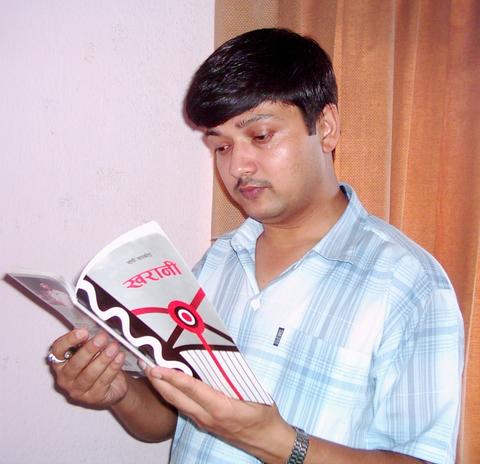 Kathmandu: ‘Kalo Aakriti’ (Black Figure), a collection of contemporary plays by poet and playwright Gopi Sapkota, was released amidst a function held at Nepal Academy in Kathmandu recently. Poet and Critic Dr. Mohan Himansu Thapa made public Sapkota’s sixth work and third dramatic one. Besides plays, Sapkota has two anthologies of poetry and a collection of children’s stories to his credit.
Kathmandu: ‘Kalo Aakriti’ (Black Figure), a collection of contemporary plays by poet and playwright Gopi Sapkota, was released amidst a function held at Nepal Academy in Kathmandu recently. Poet and Critic Dr. Mohan Himansu Thapa made public Sapkota’s sixth work and third dramatic one. Besides plays, Sapkota has two anthologies of poetry and a collection of children’s stories to his credit.Unveiling the work at the function organized by Sarwanam Theater Group, Dr. Thapa said Sapkota’s work was a blend of eastern and western philosophical and literary values. ‘Sapkota’s latest work is influenced by existential writers Jean Paul Satre, Albert Camus and Franz Kafka. He is equally influenced by the street play movement and the contemporary life style.’ He further said with the publication of Kalo Aakriti, Sapkota had established himself as a representative playwright from among the emerging writers.
Speaking at the program Dr. Govinda Raj Bhattarai, veteran litterateur and critic noted that Sapkota has emerged as a promising new generation play writer with his latest book. He further remarked that Sapkota’s work was most likely to give new direction to Nepalese theatre. ‘Among other things, Sapkota has successfully dealt with the theme of virtual reality in his plays’. Dr. Bhattarai also shared the work that he had been doing the field of criticism of plays.
Also at the program, renowned dramatist Ashesh Malla remarked ‘Sapkota has added new dimension to Nepali plays. We certainly can pin our hope on him.’ He noted that theatrical quality constituted the essence of plays and lauded Sapkota’s works for their height in this regard. He also urged the critics to study plays simply as plays and not on the basis of conventional classification between a complete and one-act play.
In the program chaired by the Coordinator of Sarwanam, Om Mani Sharma, poet Bishnu Bhivu Ghimire said the plays in Kalo Aakriti dealt with different aspects of life, love and death. He agreed with Dr. Thapa that they were markedly poetic although written in simple language.
The work published by Ratna Pustak Bhandar contains 10 plays in it.
